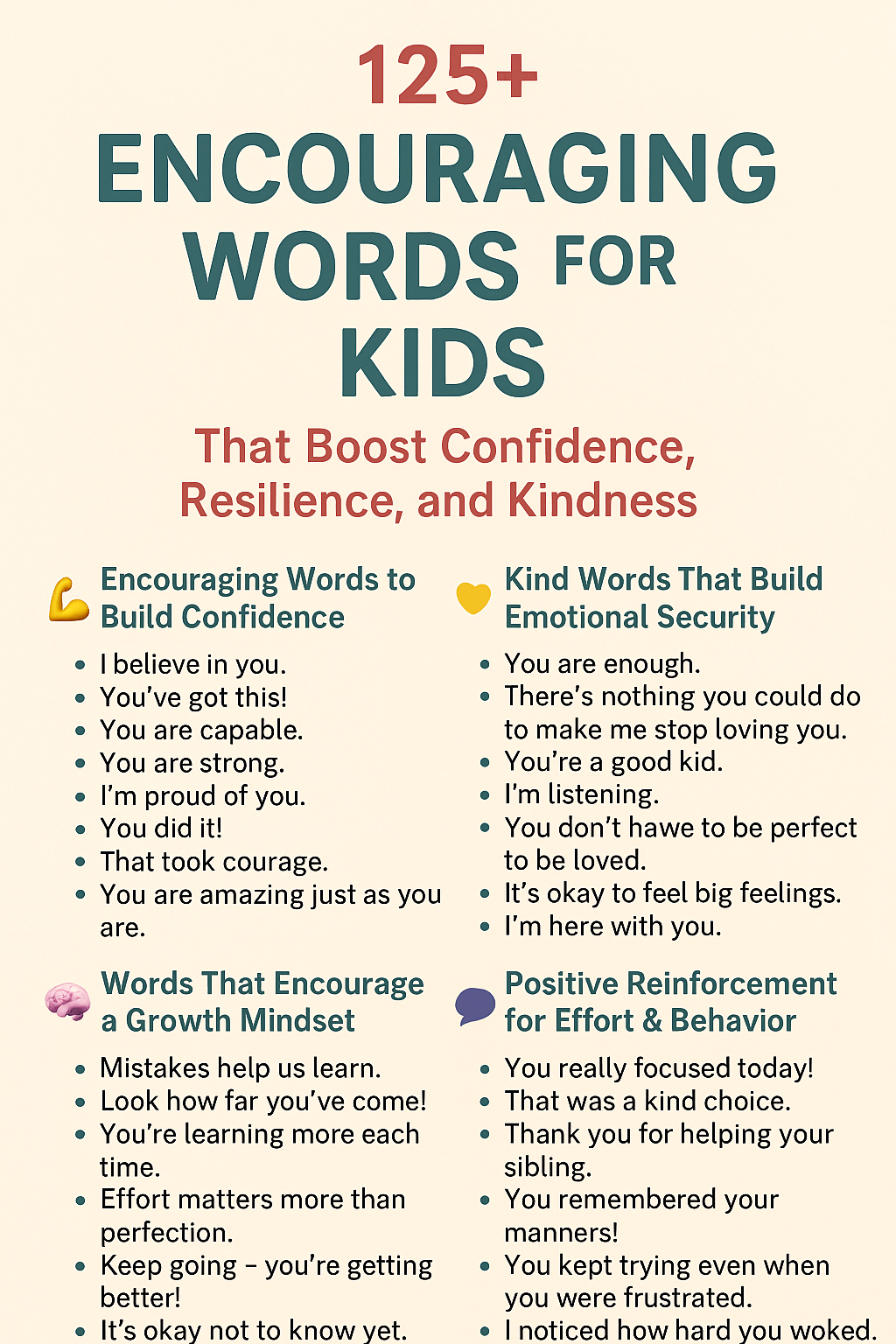125+ Encouraging Words for Kids That Boost Confidence, Resilience, and Kindness
We all want our kids to feel confident, valued, and strong—but sometimes, knowing what to say in the moment isn’t so easy. That’s where a stash of encouraging words for kids can work wonders.
Whether your child is having a rough day at school, trying something new, or simply needs a little boost, these positive phrases can nurture their self-worth, promote a growth mindset, and help them feel loved just for being themselves.
In this post, you’ll find 125+ powerful and kind words that will uplift your child and strengthen your connection. Plus, I’ve included practical ways to use them and tools to help you build the habit—without sounding like a broken record.
Heads up: This post may include affiliate links. As an Amazon Associate, I earn from qualifying purchases—at no extra cost to you. Full privacy policy and disclosure here.

Why Encouraging Words for Kids Matter
Your words become their inner voice. Studies show that children who receive frequent positive reinforcement develop stronger emotional regulation skills, better self-esteem, and are more likely to take healthy risks like trying a new sport or speaking up in class.
Unlike vague praise (“good job!”), specific encouragement helps kids see their progress and efforts. That’s the magic formula for long-term resilience and motivation.
If you’re also working on things like helping kids with self-regulation or teaching perseverance, positive words are one of the easiest (and free!) tools you can start using today.
125+ Encouraging Words for Kids
💪 Encouraging Words to Build Confidence
- “I believe in you.”
- “You’ve got this!”
- “You’re stronger than you think.”
- “I love how you tried, even when it was hard.”
- “That was brave of you.”
- “Your ideas are smart and creative.”
- “I’m so proud of the way you handled that.”
- “You were so thoughtful when you said that.”
- I believe in you.
- You’ve got this!
- You are capable.
- You are strong.
- I’m proud of you.
- You did it!
- That took courage.
- You are amazing just as you are.
- You are enough.
- You make a difference.
- You matter.
- You inspire me.
- I trust you.
- You’re doing better every day.
- You’re important to me.
- You light up the room.
- I’m lucky to be your parent.
- You’re one of a kind.
- I love spending time with you.
- You make me smile.
- I’m always here for you.
- I admire your courage.
- You are worthy of love and kindness.
- You’ve grown so much.
- You are loved—no matter what.
💡 Want to make this habit stick? Try these affirmation cards for kids you can tape to mirrors or lunchboxes!
🧠 Words That Encourage a Growth Mindset
- “Mistakes help us learn.”
- “Look how far you’ve come!”
- “You’re learning more each time.”
- “Effort matters more than perfection.”
- “Keep going—you’re getting better!”
- “It’s okay not to know yet.”
- “I’m proud of how hard you’re trying.”
- Mistakes help us grow.
- You don’t have to be perfect.
- It’s okay to try again.
- Learning takes time.
- Keep going, you’re improving.
- You can learn anything with effort.
- Every expert was once a beginner.
- You’re figuring it out.
- Let’s work through this together.
- You’re getting better with practice.
- Trying is what matters most.
- Every step counts.
- You’re on the right track.
- You’re building your skills.
- I see you working hard.
- You’ve made so much progress.
- You can do hard things.
- Challenges help us grow stronger.
- Don’t give up—this is part of learning.
- What can you try differently next time?
- You’re becoming more confident.
- You’ve come a long way.
- You’re developing a great attitude.
- Growth takes courage.
- It’s brave to keep trying.
🌱 Tip: Growth mindset is foundational for independence. See how to foster that in everyday moments: Nurturing Independence in Daily Life
Whether you’re dealing with tantrums or tough transitions, encouraging words for kids can turn conflict into connection.

💛 Kind Words That Build Emotional Security
- “You are enough.”
- “There’s nothing you could do to make me stop loving you.”
- “You’re a good kid.”
- “I’m listening.”
- “You don’t have to be perfect to be loved.”
- “It’s okay to feel big feelings.”
- “I’m here with you.”
- I see how you’re feeling.
- It’s okay to be upset.
- I’m here if you need to talk.
- Your feelings are valid.
- You’re safe.
- I hear you.
- We all have hard days.
- You can always come to me.
- I understand.
- I’ll sit with you.
- We’ll figure this out together.
- You don’t have to face this alone.
- It’s okay to cry.
- I love you even when you’re mad.
- Emotions come and go.
- You’re allowed to feel what you feel.
- You’re learning how to handle big feelings.
- I’m proud of how you calmed down.
- You’re building emotional strength.
- Take all the time you need.
- You handled that really well.
- It’s okay to take a break.
- I’m glad you told me.
- You’re doing your best.
- It’s okay not to have all the answers.
📚 Recommended read: The Affirmation Web – a gentle book for helping kids with emotional self-talk.
🙌 Positive Reinforcement for Effort & Behavior
- “You really focused today!”
- “That was a kind choice.”
- “Thank you for helping your sibling.”
- “You remembered your manners!”
- “You kept trying even when you were frustrated.”
- “I noticed how hard you worked.”
- That was very thoughtful of you.
- You were so kind just now.
- I love how you included your friend.
- That was honest and brave.
- You showed great patience.
- You really listened today.
- I noticed your kindness.
- You helped make someone’s day.
- You shared so nicely.
- You’re a great team player.
- That was generous.
- You stood up for what’s right.
- You made a responsible choice.
- You were so respectful.
- You showed great integrity.
- You stayed calm in a tough moment.
- You kept your cool—awesome job.
- I love your compassion.
- That took self-control.
- You acted like a leader.
- You owned your mistake—wow.
- You were so fair.
- You stood up for yourself kindly.
- You were brave and honest.
- That was such a mature response.
💡If you’re working on life skills at home, check out these brilliant chore ideas by age.
These encouraging words for kids are perfect for moments when your child needs reassurance, redirection, or just a reminder that they’re doing okay.
🗣️ Words for Tough Moments (Discipline with Compassion)
- “Let’s work through this together.”
- “I see you’re having a hard time.”
- “I still love you, even when we disagree.”
- “We all make mistakes—it’s how we learn.”
- “Let’s take a break and try again.”
- Thanks for your help.
- I love hearing your ideas.
- You remembered all your things—great job!
- I noticed you trying your best.
- That was so creative.
- You’re full of good ideas.
- You made a smart decision.
- You followed directions the first time—thank you.
- I love how curious you are.
- I love the way your mind works.
- You used great manners!
- You handled that all by yourself—awesome!
- You cleaned up without being asked.
- I can see you’re proud of yourself—and you should be!
- You were a problem-solver.
- You didn’t give up.
- You were ready right on time.
- You remembered everything—great memory!
- I love your questions.
- You took your time and did it right.
- You were so focused.
- You showed great effort.
- I appreciate your responsibility.
- You stayed organized—nice work.
- You’re developing amazing habits.
➡️ Related post: How to Set Limits Without Force
Simple Ways to Use Encouraging Words Every Day
- Morning Routine: Try a mirror affirmation with a phrase like “You’re ready to do great things today.”
- Lunchbox Notes: Tuck in a sticky note that says “I’m proud of how hard you’re trying at math.”
- Dinner Table Compliments: Each family member says one kind thing about another.
- Bedtime Wind-down: Use calming phrases like “You were such a great helper today.”
🎁 Want a quick way to start? These positive affirmation books for kids make bedtime routines even more empowering.
One of the most powerful parenting tools is simply having a mental bank of encouraging words for kids that you can draw on throughout the day.
Tools to Reinforce Encouraging Language
Here are a few parent-approved resources that help build a culture of positivity at home:
- Affirmation Cards for Kids – Visual, interactive, and perfect for young readers
- I Am Enough by Grace Byers – A must-read children’s book for self-worth
- Positive Word Posters – Hang them up in a calm corner or learning space
- Gratitude Journals for Kids – A writing tool that encourages reflection and positive expression
- Kindness Rocks Painting Kit – Turn positive words into art!

FAQ: Encouraging Words for Kids
Using encouraging words for kids regularly helps reinforce the values you’re already trying to teach at home—like empathy, kindness, and perseverance.
Why are encouraging words so important for children?
Encouraging words help shape your child’s self-concept. When children hear consistent positive feedback, they’re more likely to develop self-confidence, emotional resilience, and healthy interpersonal relationships.
What’s the difference between praise and encouragement?
Praise focuses on outcomes (“You got an A!”), while encouragement focuses on effort (“You studied so hard for that test!”). Encouragement nurtures intrinsic motivation.
How can I teach my child to use encouraging words with others?
Model it! When you use kind, specific words regularly, kids naturally start to reflect that back to peers. Also, books and role-play can help reinforce this concept.
Are there tools or resources that help kids internalize positive messages?
Absolutely! Try affirmation cards, wall art, or even a gratitude journal. This one is a great beginner option.
What if my child rolls their eyes or seems embarrassed by compliments?
That’s normal—especially for older kids. Keep it simple, sincere, and consistent. Over time, they’ll begin to internalize your words even if they don’t respond outwardly.
Final Thoughts: Words That Last a Lifetime
Using encouraging words for kids isn’t about sugarcoating or inflating their egos—it’s about reminding them that they are capable, valued, and loved. Even a few words, said with intention, can echo for years in your child’s heart.
So whether you’re cheering them on before a big test, calming their nerves before a new experience, or just trying to get through bedtime without losing your mind—your words matter more than you know.
📌 Like this post? Save it to Pinterest so you always have the list handy!

💬 What’s your favorite way to encourage your kids? Drop it in the comments—I’d love to hear your go-to phrases!
